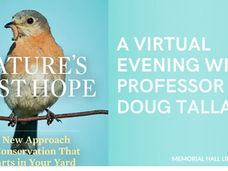
NATIVE PLANTS & POLLINATORS
Why are native plants important?
It is generally known that native plants are the best at feeding native pollinators and wildlife, such as local butterflies, bumblebees, moths and birds. They are beautiful, are important for biodiveristy, and are resilient in the face of drought, flooding, and temperature challenges.
Where can you find a list of native plants to grow in your yard?
Grow Native Massachusetts has a great list (click "List of MA Native Plants" to the right).
Where can you buy native plants?
Although many nurseries and big box stores sell native plants, often they have been grown with pesticides. The pesticide residue from treated plants can harm, and even kill, pollinators and other beneficial insects. Plants grown with the systemic neonicitinoid "neonics" contain the toxic pesticides in all plant parts. So the pollen and nector foraged by pollinators is toxic to them.
It is important to buy native plants only from sources known to be pesticide free. Grow Native Massachusetts has an extensive list of sources. You can also find a great selection at the Native Plant Trust (see link to the right).
What can you do if your local nursery is not on the Grow Native Massachusetts list of native plant sources?
Talk to them and let them know you want plants free of pesticide contamination. Ask the nursery personnal what, if any, pollinator safe practices they use. Watch this webinar "Buying Bee-Safe Plants - How You Can Help" for tips on how to have a conversation. If the nursery personnel are too busy to talk, download and leave them a copy of "Offering Bee-Safe Plants: A Guide For Nurseries".
Grow your own native plants!
Gather seeds responsibly from native plants growing locally, check out the Seed Library at your local library, or buy seeds from bee-friendly seed companies. A tutorial can be found at the Wild Seed Project's How to Grow From Seed.
Learn about this process here Winter Seed Sowing

EDUCATIONAL VIDEOS & WEBINARS

A R T I C L E S & R E S O U R C E S
The links below provide information and resources regarding native plants and pollinators.

More
Find a Pollinator Group Near You
The Mass Pollinator Network supports the growing number of individuals, communities, organizations, and research groups working to protect pollination systems across the Commonwealth. This clickable map displays community groups and conservation organizations across the state that are focused on improving pollinator health. Also displayed are towns that have passed pollinator-friendly resolutions and related local policies.
Seed Libraries in Massachusetts
Seed libraries can be a great source of
free seeds. This is a list of ones located
in Massachusetts. Check out one near
you to see if they have seeds of locally
grown native plants.
If you know a seed library but don't see it listed, please contact gcfmwebmaster@gmail.com and let us know so we can post it.
NAME | ADDRESS | TOWN |
|---|---|---|
West Acton Citizens Library | 21 Windsor Ave | Acton |
Memorial Hall Library | 2 North Main Street | Andover |
Beverly Public Library | 32 Essex Street | Beverly |
Boston Public Library | 700 Boylston Street | Boston |
Newbury Town Library | 0 Lunt Street | Byfield |
Easthampton Public Library | 9 Park Street | Easthampton |
Framingham Public Library | 49 Lexington Street | Framingham |
Georgetown Public Library | 2 Maple Street | Georgetown |
Grafton Public Library | 35 Grafton Common | Grafton |
Harvard Public Library | 4 Pond Road | Harvard |
Reuben Hoar Library | 35 Shattuck Street | Littleton |
Mattapoisett Free Public Library | 7 Barstow Street | Mattapoisett |
Medford Public Library | 111 High Street | Medford |
Melrose Public Library | 263 West Foster Street | Melrose |
Norwell Public Library | 64 South Street | Norwell |
Peabody Institute Library | 82 Main Street | Peabody |
Reading Public Library | 64 Middlesex Ave | Reading |
Gaylord Memorial Library | 47 College Street | South Hadley |
Suzanne Davis Seed Library | 95 Feeding Hills Road | Southwick |
Conant Public Library | 4 Meetinghouse Hill Road | Sterling |
Goodnow Library | 21 Concord Road | Sudbury |
Tewksbury Public Library | 300 Chandler Street | Tewksbury |
Topsfield Town Library | 1 South Common Street | Topsfield |
J. V. Fletcher Library | 50 Main Street | Westford |
Find a Pollinator Pathway Group
Organized by local volunteers, Pollinator Pathways can be created when native plants such as trees, shrubs and wildflowers are used in a garden to attract pollinators. Avoiding pesticides is a critical part of being on the Pollinator Pathway network.
Find towns along the Pollinator Pathway Network in Massachusetts, and learn more about how to start a Pollinator Pathway in your town.























